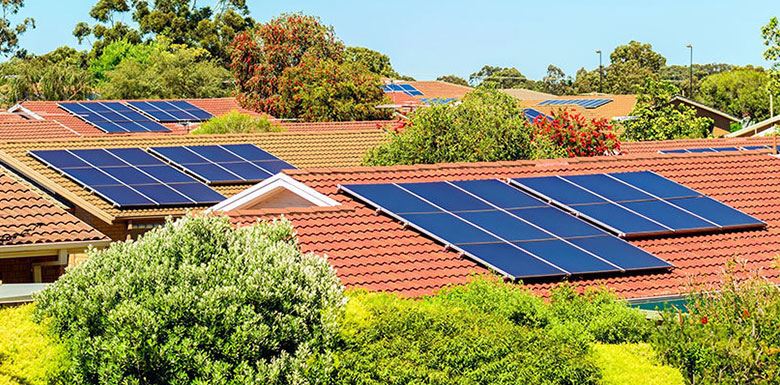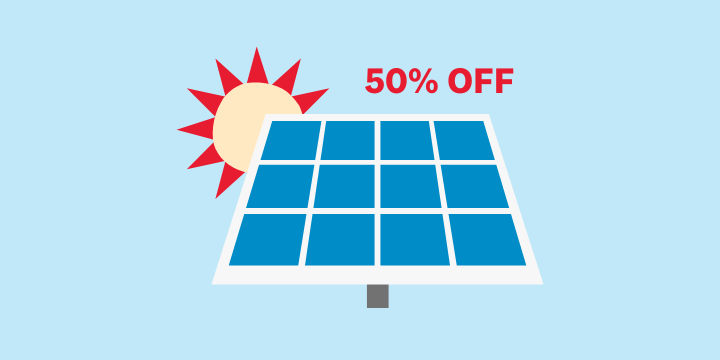Are solar panels worth it?
 In this article
In this article
Energy prices may have come down compared to the dizzy heights they reached in 2022 and 2023, but you can cut your bills further by reducing your energy use or finding alternative sources of energy.
That’s where solar panels come in. Rather than getting all of your electricity from an energy company to power your home, you can generate some of it yourself using the sun. This saves you money on your energy bills in the process. You can also earn money by selling your excess energy back to suppliers, adding to the potential savings.
The demand for solar panels has jumped sharply over the last few years, according to figures from the Microgeneration Certification Scheme (MCS) – a quality assurance scheme led by the low-carbon energy industry. The number of solar photovoltaic (PV) installations reached almost 190,000 in 2023 compared to around 138,000 in 2022. There have already been more than 96,000 so far this year.
Solar PV panels generate electricity from the sun while solar thermal panels generate heat.
Helping the planet
Another benefit is that the energy you generate will be renewable, helping you reduce your carbon footprint and your impact on the planet. Measures to tackle climate change mean we’ll all have to reduce our reliance on fossil fuels. Installing solar panels is one way to do this.
While there are plenty of renewable electricity tariffs available from suppliers, the actual energy coming into your home isn’t guaranteed to be renewable as it’s simply part of the mix you get through the grid. If you’re generating your own electricity using solar panels, however, you’ll know for sure that you’re using renewable energy for at least some of your energy needs.
As the outlay involved in installing solar panels is significant, it can take many years for your investment to pay for itself. But if energy prices increase, the amount you could save by using electricity you’ve generated yourself rather than buying it all from a supplier will rise too. This helps to pay off your investment sooner. Some suppliers have also increased the amount they pay you for your surplus energy.
Homeowners with solar panels already would have welcomed the summer sunshine as they would have generated a significant amount of electricity. You could do the same by installing panels in time for next summer.
How much can you save?
According to Energy Saving Trust, the cost of the average solar PV system for a home is around £7,000 but this varies according to a range of factors. These include the installer, how easy your roof is to access and how many panels you get – 10 is typical.
Installation costs have risen recently but the VAT rate on certain types of energy-saving materials like solar panels has been cut to 0% until 2027.
The more of your energy you use during daylight hours when you’re generating electricity, the more you’ll save. Based on fuel prices from July 2024, if you live in London and are home all day, you could save £330 a year on your electricity bills. This means it would take 22 years to pay for the cost of your investment, according to Energy Saving Trust.
If you also received payments through the Smart Export Guarantee (SEG) – the government-backed scheme through which suppliers pay you for the surplus energy you export to the grid – you would save £600 a year. Then you would pay for your investment in just 12 years. On the other hand, if you were out all day until 6pm, you would only save £510 with the SEG. It would take you 14 years to pay for your investment.
Energy prices are predicted to rise from October, so the savings you can make will increase while the payback time will decrease.
Maximising your savings
You can boost your energy savings by running appliances like washing machines and dishwashers during the day and reducing your energy use to minimise the amount of energy you need to buy from a supplier.
Other ways are combining your solar system with a solar hot water system or a heat pump to heat your home instead of using gas, or installing a PV diverter. This uses your excess energy to heat water in a tank that’s stored for when you need it. You can also buy a battery to store excess energy. These extras will all add to the cost of your investment, though.
According to Energy Saving Trust, savings on hot water for a gas-heated four-bedroom detached home with a hot water cylinder and PV diverter could be £530 a year if you’re home all day and receive SEG payments. Installing a PV diverter switch with solar panels costs around £800 extra.
Training to become a solar panel installer
With the increased demand for solar panels likely to continue, if you’re already a heating engineer or electrician, or you want to retrain, adding to your skills by learning to install solar panels could boost your business and your income.
To install solar systems that are intended to feed excess energy back into the grid, you’ll need to get certified through the MCS. You don’t need to get accreditation yourself if your employer is MCS accredited.
You’ll need to attend MCS-approved training courses to learn the skills necessary to demonstrate your competency in installing solar panels. Visit the MCS website for a list of courses. You can filter them according to the type of technology you want to learn to install.
Before your MCS assessment you’ll need to join the Renewable Energy Consumer Code (RECC) or the Home Insulation & Energy Systems Quality Assured Contractors Scheme (HIES). This shows you are committed to complying with a consumer code that sets out standards for delivering services and protecting customers beyond what’s legally required.
These bodies also support you in a number of ways, such as by giving you access to deposit protection and insurance schemes, helping you market your business, and delivering training on how to comply with the code and the law. They also provide mediation to help you resolve disputes with customers.
Sustainable traders - get 50% off the assessment fee, plus 50% off monthly fees for six months
Open to installers of energy efficient windows, insulation, heat pumps and solar panels. Offer ends 30 Sept 2024. Must have been trading for 6 months with no more than 29 employees.





